Hobbins
Well-Known Member
- Joined
- Oct 15, 2012
- Messages
- 119
- Reaction score
- 0
AG#2. Fullers London Porter (GW Book)
So onto AG#2 going from an American Pale Ale to a nice dark porter. This recipe was taken from Brew Your Own British Ales by Graham Walker and adapted for my 30L BIAB boiler using the calculator from the Aussie BIAB forum.
AG#1. BIAB. Fullers London Porter
OVERVIEW
Style: London Porter (1880âs recipe)
Name: Fullers London Porter
Yeast: Danstar Windsor
Original Gravity: 1.053
Total IBUâs: 30.8
Efficiency at End of Boil: 75%
Mash Length (mins): 90
Boil Length (mins): 90
VOLUMES/TEMPS
Vessel Volume: 30L
Water Required: 26.33L
Mash Temperature: 66C
Volume at End of Boil: 19.2L
Volume into Fermenter: 16.2L
Brew Length: 15L
Total Grain Bill:
GRAINS â COLOURS â PERCENTAGES AND/OR WEIGHT
Grain 1: Pale Ale Malt, Maris Otter â 5 EBC â 3,196g
Grain 2: Crystal Malt - 125 EBC - 504g
Grain 3: Brown Malt â 135 EBC - 412g
Grain 4: Chocolate Malt â 900 EBC â 84g
HOPS
Hop 1: Fuggles â 3.9AA% - 42.5g - Start of boil
Hop 2: Fuggles â 3.9AA% - 14.4g - 10 mins from end min
ADJUNCTS/MINERALS/FININGS
Finings: ½ teaspoon of protofloc 10 mins from end of boil
Decided to go for a brew after work as I had the house to myself for the evening. Cleaning and sanitising started at 17.45. I rehydrated the Danstar Windsor yeast in 100ml of cooled boiled water at 33C with teaspoon of light DME. This set off nicely and filled the pyrex jug with frothy yeasty goodness by the time it came to pitching.
The boiler went on at 18.14 with 26.33L of water in. I was worried with the amount of grist going in the boiler would be overflowing. The BIAB calculator said that the total volume with the grains in the boiler would be 29.1L and it was bang on!
The boiler was up to strike temp quickly and I hadnât weighed the grains yet so it went off and back on and hit strike temp 69C at 19.00. Then the lovely grains went in
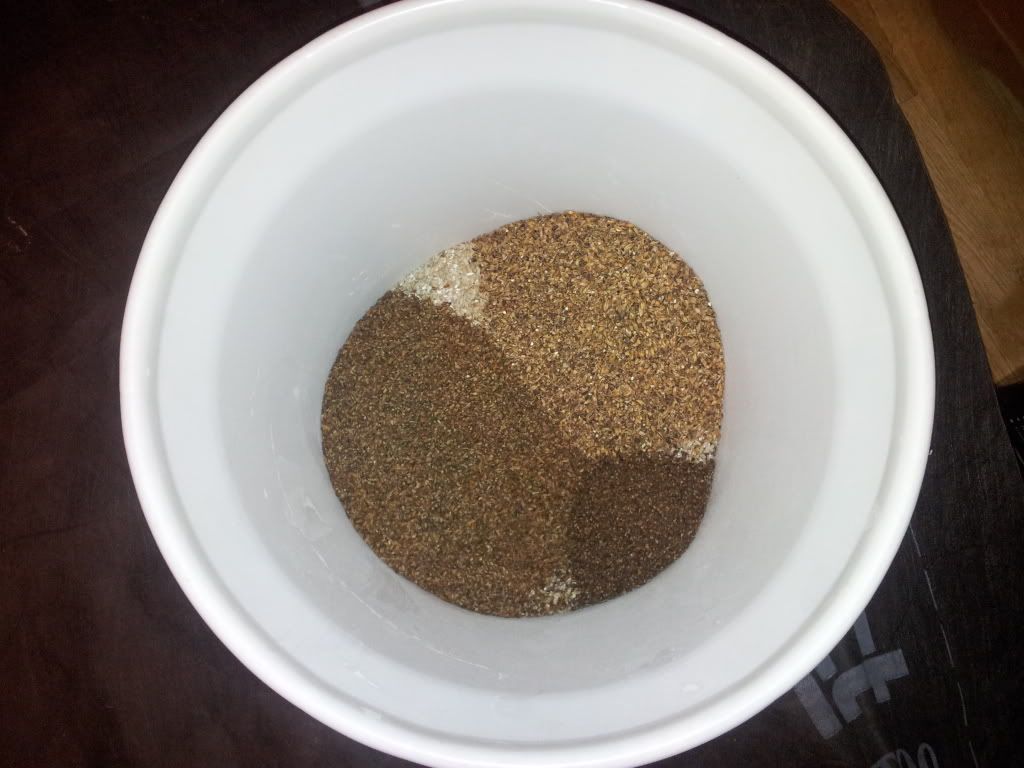
By 19.06 I had doughed in and the temp had dropped to 64C I had forgotten to measure grain temp before dumping them in so heat applied back up to 66C, mash started at 19.08. With a few stirs
Stirred 19.38 Temp 65C (heat up to 66C)
Stirred 20.08 Temp 66C
Uncovered 20.38 Temp 66C
Mash out â raise temps to 78C by 20.45 I then left to settle for 20 mins and took the grains out and it looked like this
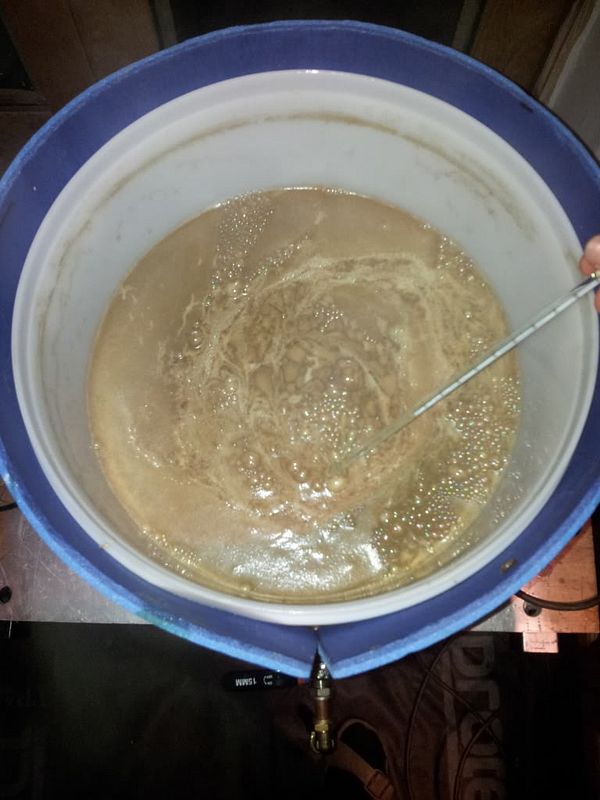
Yum
Pre boil gravity 1.042
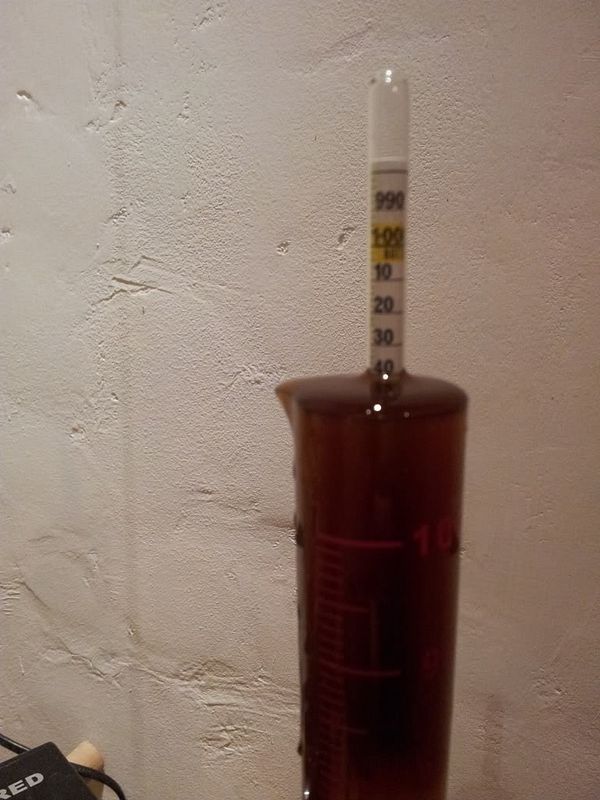
I didnât sparge this time as Iâm trying to alter things each brew as Iâm learning the craft and I want to see what the results are.
Heat on 21.11
Boil started 21.20
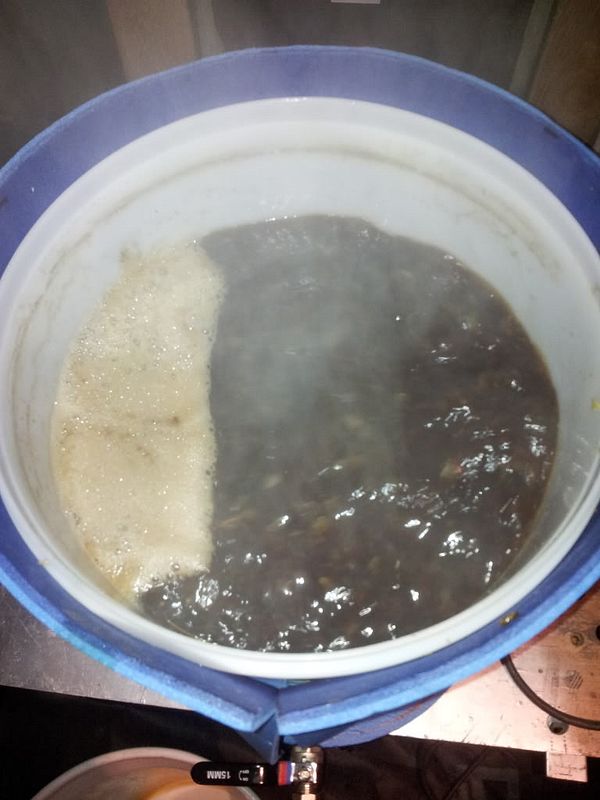
First hops in start of boil 21.20
Estimated Volume at the start of boil 24L
Second Hops (10 mins from end) 1/2 level teaspoon of protofloc and immersion cooler in 22.40
Boil end, cooler on 22.50
Estimated volume at end of boil 19.75L
Cooled down to 22C 23.16
Original Gravity 1.052, this was one point under target so not bad, perhaps a sparge would have helped, or an overnight mash?
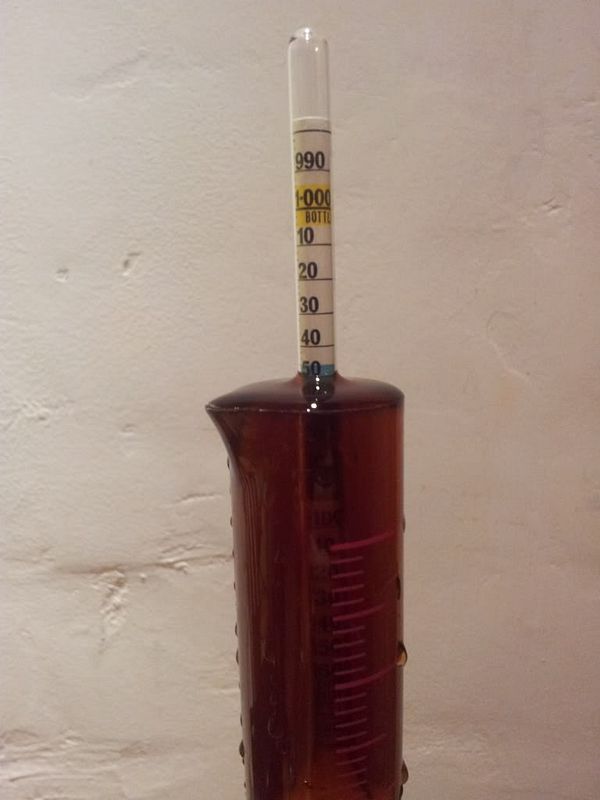
Left to Settle for 20 mins
In fermenter and yeast pitched 23.58
The whole brew went very well apart from one aspect. Iâm using a stainless steel braid for a hop filter in the bottom of the boiler. My first brew the wort took an age to drain out. This brew it stopped after a litre. I added ½ a teaspoon of protofloc at 10 mins before the end of the boil even thought the recipe didnât call for it. Would this account for the blockage?
I had to gently rub the braid with a long handed spoon to move the hops away and allow the wort through, this also allowed a lot of the cold break material into the fermenter. The yeast took off overnight and it bubbling away nicely now so thereâs no much I can do about it but will this have an effect on the brew?
Any recommendations for a better hop strainer as I want to try and avoid this happening again?
So onto AG#2 going from an American Pale Ale to a nice dark porter. This recipe was taken from Brew Your Own British Ales by Graham Walker and adapted for my 30L BIAB boiler using the calculator from the Aussie BIAB forum.
AG#1. BIAB. Fullers London Porter
OVERVIEW
Style: London Porter (1880âs recipe)
Name: Fullers London Porter
Yeast: Danstar Windsor
Original Gravity: 1.053
Total IBUâs: 30.8
Efficiency at End of Boil: 75%
Mash Length (mins): 90
Boil Length (mins): 90
VOLUMES/TEMPS
Vessel Volume: 30L
Water Required: 26.33L
Mash Temperature: 66C
Volume at End of Boil: 19.2L
Volume into Fermenter: 16.2L
Brew Length: 15L
Total Grain Bill:
GRAINS â COLOURS â PERCENTAGES AND/OR WEIGHT
Grain 1: Pale Ale Malt, Maris Otter â 5 EBC â 3,196g
Grain 2: Crystal Malt - 125 EBC - 504g
Grain 3: Brown Malt â 135 EBC - 412g
Grain 4: Chocolate Malt â 900 EBC â 84g
HOPS
Hop 1: Fuggles â 3.9AA% - 42.5g - Start of boil
Hop 2: Fuggles â 3.9AA% - 14.4g - 10 mins from end min
ADJUNCTS/MINERALS/FININGS
Finings: ½ teaspoon of protofloc 10 mins from end of boil
Decided to go for a brew after work as I had the house to myself for the evening. Cleaning and sanitising started at 17.45. I rehydrated the Danstar Windsor yeast in 100ml of cooled boiled water at 33C with teaspoon of light DME. This set off nicely and filled the pyrex jug with frothy yeasty goodness by the time it came to pitching.
The boiler went on at 18.14 with 26.33L of water in. I was worried with the amount of grist going in the boiler would be overflowing. The BIAB calculator said that the total volume with the grains in the boiler would be 29.1L and it was bang on!
The boiler was up to strike temp quickly and I hadnât weighed the grains yet so it went off and back on and hit strike temp 69C at 19.00. Then the lovely grains went in

By 19.06 I had doughed in and the temp had dropped to 64C I had forgotten to measure grain temp before dumping them in so heat applied back up to 66C, mash started at 19.08. With a few stirs
Stirred 19.38 Temp 65C (heat up to 66C)
Stirred 20.08 Temp 66C
Uncovered 20.38 Temp 66C
Mash out â raise temps to 78C by 20.45 I then left to settle for 20 mins and took the grains out and it looked like this

Yum
Pre boil gravity 1.042

I didnât sparge this time as Iâm trying to alter things each brew as Iâm learning the craft and I want to see what the results are.
Heat on 21.11
Boil started 21.20

First hops in start of boil 21.20
Estimated Volume at the start of boil 24L
Second Hops (10 mins from end) 1/2 level teaspoon of protofloc and immersion cooler in 22.40
Boil end, cooler on 22.50
Estimated volume at end of boil 19.75L
Cooled down to 22C 23.16
Original Gravity 1.052, this was one point under target so not bad, perhaps a sparge would have helped, or an overnight mash?

Left to Settle for 20 mins
In fermenter and yeast pitched 23.58
The whole brew went very well apart from one aspect. Iâm using a stainless steel braid for a hop filter in the bottom of the boiler. My first brew the wort took an age to drain out. This brew it stopped after a litre. I added ½ a teaspoon of protofloc at 10 mins before the end of the boil even thought the recipe didnât call for it. Would this account for the blockage?
I had to gently rub the braid with a long handed spoon to move the hops away and allow the wort through, this also allowed a lot of the cold break material into the fermenter. The yeast took off overnight and it bubbling away nicely now so thereâs no much I can do about it but will this have an effect on the brew?
Any recommendations for a better hop strainer as I want to try and avoid this happening again?



